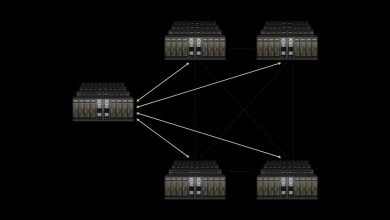Vietnam Expected to Become Global Games Industry Powerhouse with Google Cloud Partnership

VNGGames, Amanotes, and Wolffun Game among the games businesses that are leveraging cloud, analytics, and AI technologies to serve the domestic market and accelerate international expansion
At its Games Industry Showcase event, Google Cloud highlighted trends and innovations to enable Vietnam’s games businesses to reach a global audience and support the Ministry of Information and Communications’ goal of increasing the local games industry’s revenue from US$600 million to US$1 billion within five years. Further strategic collaborations with VNGGames, Amanotes, and Wolffun Game were announced as the games companies harness Google Cloud’s infrastructure, analytics, and AI capabilities to more effectively serve large audiences, unlock player and game insights, accelerate time to market, and revolutionize real-time player experiences.
Toan Duc Nguyen, Country Manager, Vietnam, Google Cloud, said: “While consumers were starting to adopt smartphones en masse more than a decade ago, local game developers quickly became early pioneers in incorporating this trend into their business models. Today, nearly half of the planet plays games; the majority through their mobile device. The global games market is also set to generate more than US$187 billion in revenue in 2023 – and this is more than five times higher than projected global movie ticket sales revenue in 2023, underscoring the massive international growth opportunity for games businesses. Vietnam’s mobile-first consumer economy and vast developer talent pool, combined with investments in full-fiber networks by telcos like FPT Corporation and games companies’ willingness to embrace new technologies to supercharge game production, could very well enable its games industry to leapfrog established games markets—which are better known for console and PC games—in exporting high-quality mobile games for the rest of the world.”
Optimizing game capacity and performance to serve the largest player audiences
Regardless of whether it is 100,000 or 10 million players logging in simultaneously, every gamer expects a reliable live experience. Yet, games companies struggle to accurately forecast the computing resources needed to accommodate fluctuations in player numbers. This situation creates a dilemma: overprovision server capacity and incur unnecessary costs when there are fewer players than anticipated, or underprovision server capacity and risk being unable to serve a larger volume of players.
VNGGames, a leading game publisher in Asia, uses Google Cloud’s global edge network and web application firewalls—with technical implementation support from Cloud Ace—to serve its Gunny Origins and Dead Target mobile shooter games content as close to users as possible while defending against botnet attacks. This enables VNGGames to reduce latency and load on its servers to cost-effectively reach millions of players, wherever they might be. Given that players regularly attain new levels, add friends, and make in-game purchases, games companies cannot afford to “forget” player progress. VNGGames has also been using Google Cloud’s scalable database management service to automatically organize and secure player profiles. This ensures they can pick up where they left off, every single time.
Le Trong Giap, Head of Game Publishing Platform, VNGGames, said: “The same infrastructure that is powering live services like Google Search and YouTube for billions of users is now enabling us to deliver live game experiences to players in multiple markets. We do not need to compromise between achieving performance, manageability, and scale, since Google Cloud services have effectively eliminated the need for manual infrastructure configurations.”
When Wolffun Game, a development studio that specializes in player-versus-player games for mobile platforms, was launching its flagship games Thetan Arena and Heroes Strike to an international audience, it wanted to be able to celebrate—and not be encumbered by—potential success. It therefore decided to operate these games using services like Google Kubernetes Engine (GKE)—with technical implementation support from Cloud Kinetics—to ensure a smooth experience for users.
This ensured that Wolffun Game could seamlessly connect eight online players to each other per round, and concurrently facilitate millions of rounds to deliver a global eSports experience. With GKE’s autoscaling capabilities, Wolffun Game can handle 10 times the usual player traffic with a smooth user experience, before automatically scaling down to optimize costs when additional computing resources are no longer needed. With Google Cloud’s support, Thetan Arena and Heroes Strike are now award-winning games with over 28 million and 10 million players worldwide, respectively.
Going a step further, Wolffun Game is now using Agones, a dedicated game server orchestrator created by Google Cloud and Ubisoft, to support specific functions within Thetan Rivals, its latest online multiplayer party royale game. This includes the game’s Lobby feature for efficient player allocation.
Unlocking player and game insights, and accelerating time to market
With more than three billion players in the world and finite resources available, it is crucial for developers to invest in an understanding of what works and segment players accordingly to attract them, while continuously evolving the live game experience to retain them. They can therefore take advantage of analytics and AI to predict the success of new features, personalize offers based on player behavior, and localize games for users in new markets.
Amanotes, a leading music games publisher, has been using Google Cloud’s serverless data warehouse and streaming analytics service to unite player and game data that was locked in silos, enabling staff to pull real-time insights from the data to enhance decision-making. With these insights informing everything from gameplay design, to which songs to acquire licenses for and integrate into its games, to user acquisition and monetization strategy, Amanotes game titles like Magic Tiles 3, Tiles Hop, and Dancing Road—have now penetrated 190 countries, with significant market share in the UK, the US, and Brazil.
Amanotes views AI as the next frontier in modern technology innovation and is actively haressing AI to reimagine game development and distribution. The company invests significantly in machine learning systems, in collaboration with Google Cloud and Cloud Ace, to implement automation, thereby ensuring scalability and efficiency when serving billions of users.
Bill Vo, Chief Executive Officer and Co-founder, Amanotes, said: “We utilized Google Cloud’s data analytics and AI services to create and maintain our products, with highly competent technical assistance from Google Cloud engineers and its implementation partners. Google Cloud’s AI-first approach and data science expertise have helped our games achieve over three billion downloads to date.”
In the same vein, VNGGames has been using Google Cloud’s Translation API, which can be customized to recognize domain- and context-specific terms or phrases, including games lingo like “AFK,” “nerf,” “buff,” and more, and instantly translate texts into more than 100 languages. As a result, VNGGames has been able to speed up the process of localizing Revolution Thien Du to reach more players in new markets across Southeast Asia.
“It is a known fact that individuals prefer to play games that reflect their culture, in their preferred language. To reduce time to market and seize international growth opportunities, we have been tapping Google’s rich experience in providing industry-leading machine translation services to organizations and consumers. This has significantly accelerated a localization process that used to be manual and highly tedious,” added Giap.
Unleashing boundless creativity and revolutionizing real-time player experiences
Game content creation is one of the largest expenses game studios can incur, in terms of financial and human resources. Even with large investments, development teams can struggle to keep up with player demand for new content, especially as their audiences grow to reach international scale.
Generative AI (gen AI)—which refers to the use of foundation models to create new content like text, images, audio, and videos with minimal training data—can help development teams create compelling content like code, art, and dialogue at a much faster pace.
Wolffun Game, for instance, is planning to use Google Cloud’s Vertex AI Conversation to quickly build and test advanced chatbots. These chatbots will be capable of having lifelike conversations with players of Thetan Rivals. They will instantly generate customized versions of game items or character skins in response to simple, natural language prompts. Wolffun Game then plans to go even further by integrating dynamic gen AI into a creative application called Thetan Creator, which will create entirely novel content in real-time, such as unique game characters, based on the demands of its players.
Nguyen Dinh Khanh, Chief Executive Officer, Wolffun Game, said: “The effort required to bring Thetan Rivals to life spanned over six months. This included a focus on creating and refining the game’s art style and environmental aesthetics. Gen AI now enables us to expand the range of experiences our team can deliver and opens up new avenues for audience engagement and monetization, without adding to our team’s already intense workload. We chose Google Cloud because its enterprise-grade gen AI includes built-in mechanisms that allow us to harness this technology while respecting intellectual property rights and safeguarding our proprietary data. With AI enhancing human creativity to accelerate future game production, our goal for Thetan Rivals is to attract 100 million players worldwide and provide a customizable system for every player to freely express themselves through user-generated content.”
“Gen AI will make the biggest impact on the games industry since the emergence of real-time 3D graphics and smartphones. By staying at the forefront of technology adoption, the games industry can serve as a beacon of innovation for other businesses, showcasing new ways to inform, engage, and connect people at scale. At Google Cloud, we are dedicated to providing workload-optimized infrastructure, robust data analytics, and the most powerful and responsible AI capabilities to help advance Vietnam’s digital economy and establish the country as a global games industry powerhouse,” added Toan.
To empower businesses in Vietnam—including more game developers and publishers—to innovate with gen AI quickly, securely, and responsibly, Google Cloud also unveiled new skills development training options, foundation models and tools, and the Google for AI Startups Cloud Program at its Games Industry Showcase event. The training options include the Introduction to Generative AI Learning Path and The Arcade, a gamified learning experience – both of which are available at no cost to individuals.




